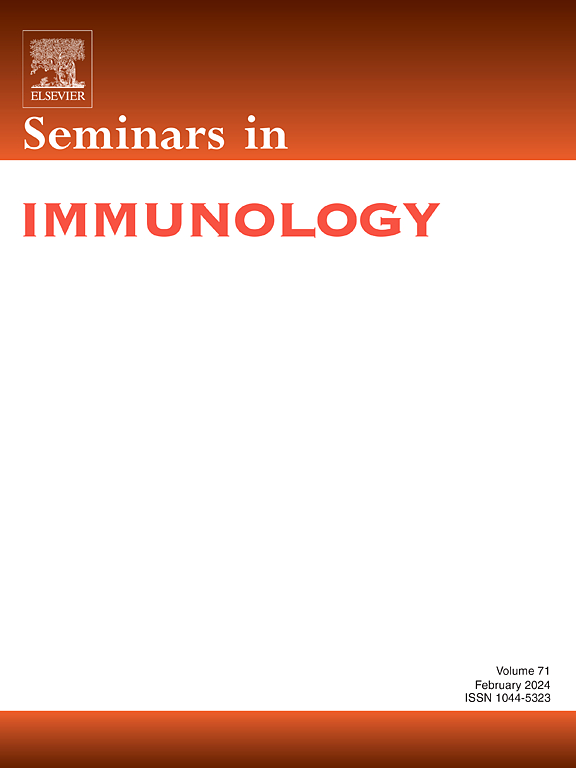Complement regulators as novel targets for anti-cancer therapy: A comprehensive review
IF 7.8
2区 医学
Q1 IMMUNOLOGY
引用次数: 0
Abstract
Cancer remains a formidable global health challenge requiring the continued exploration of innovative therapeutic approaches. While traditional treatment strategies including surgery, chemotherapy, and radiation therapy have had some success, primarily in early-stage disease, the quest for more targeted, personalized, safer, and effective therapies remains an ongoing pursuit. Over the past decade, significant advances in the field of tumor immunology have dramatically shifted a focus towards immunotherapy, although the ability to harness and coopt the immune system to treat cancer is still just beginning to be realized. One important area that has yet to be fully explored is the complement system, an integral part of innate immunity that has gathered attention recently as a source of potential targets for anti-cancer therapy. The complement system has a complex and context dependent role in cancer biology in that it not only contributes to immune surveillance but also may promote tumor progression. Complement regulators, including CD46, CD55, CD59, and complement factor H, exercise defined control over complement activation, and have also been acknowledged for their role in the tumor microenvironment. This review explores the intricate role of complement regulators in cancer development and progression, examining their potential as therapeutic targets, current strategies, challenges, and the evolving landscape of clinical research.
补体调节因子作为抗癌治疗的新靶点:综述
癌症仍然是一个巨大的全球健康挑战,需要继续探索创新的治疗方法。虽然包括手术、化疗和放射治疗在内的传统治疗策略已经取得了一些成功,主要是在早期疾病中,但寻求更有针对性、个性化、更安全、更有效的治疗方法仍然是一个持续的追求。在过去的十年里,肿瘤免疫学领域的重大进展已经极大地将焦点转移到免疫治疗上,尽管利用和利用免疫系统治疗癌症的能力仍然刚刚开始实现。一个尚未被充分探索的重要领域是补体系统,它是先天免疫的一个组成部分,最近作为抗癌治疗的潜在靶点而受到关注。补体系统在癌症生物学中具有复杂的环境依赖性作用,它不仅有助于免疫监视,还可能促进肿瘤的进展。补体调节因子,包括CD46、CD55、CD59和补体因子H,对补体激活有明确的控制,并且它们在肿瘤微环境中的作用也得到了承认。这篇综述探讨了补体调节因子在癌症发生和进展中的复杂作用,研究了它们作为治疗靶点的潜力、当前的策略、挑战和临床研究的发展前景。
本文章由计算机程序翻译,如有差异,请以英文原文为准。
求助全文
约1分钟内获得全文
求助全文
来源期刊

Seminars in Immunology
医学-免疫学
CiteScore
11.40
自引率
1.30%
发文量
50
审稿时长
89 days
期刊介绍:
Seminars in Immunology is a specialized review journal that serves as a valuable resource for scientists in the field of immunology. The journal's approach is thematic, with each issue dedicated to a specific topic of significant interest to immunologists. It covers a wide range of research areas, from the molecular and cellular foundations of the immune response to the potential for its manipulation, highlighting recent advancements in these areas.
Each thematic issue is curated by a guest editor, who is recognized as an expert in the field internationally. The content of each issue typically includes six to eight authoritative invited reviews, which delve into various aspects of the chosen topic. The goal of these reviews is to provide a comprehensive, coherent, and engaging overview of the subject matter, ensuring that the information is presented in a timely manner to maintain its relevance.
The journal's commitment to quality and timeliness is further supported by its inclusion in the Scopus database, which is a leading abstract and citation database of peer-reviewed literature. Being indexed in Scopus helps to ensure that the journal's content is accessible to a broad audience of researchers and professionals in immunology and related fields.
 求助内容:
求助内容: 应助结果提醒方式:
应助结果提醒方式:


